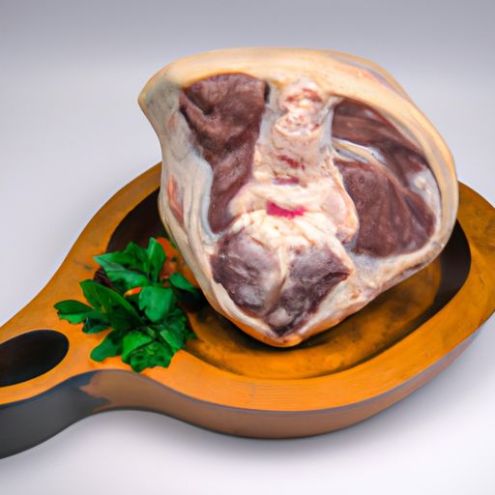Table of Contents
Benefits of Adding Goat Meat to Your Diet
Meat is a staple in many diets around the world, providing essential nutrients and proteins that are necessary for a healthy lifestyle. While Beef and chicken are commonly consumed meats, goat meat is also a popular choice that offers a unique flavor and numerous health benefits. In this article, we will explore the benefits of adding goat meat to your diet.
Goat meat, also known as chevon, is a lean Protein that is low in fat and cholesterol. This makes it a healthier alternative to other meats, especially for those looking to reduce their intake of saturated fats. Additionally, goat meat is rich in essential nutrients such as Iron, Zinc, and vitamin B12, which are important for maintaining overall health and well-being.
One of the key benefits of goat meat is its high protein content. Protein is essential for building and repairing tissues in the body, making it an important component of a balanced diet. Goat meat is a great source of high-quality protein, making it an excellent choice for those looking to increase their protein intake.
In addition to its nutritional benefits, goat meat is also a versatile ingredient that can be used in a variety of dishes. Its unique flavor profile makes it a popular choice in many cuisines around the world, adding depth and richness to dishes such as curries, stews, and kebabs. Whether grilled, roasted, or stewed, goat meat is a delicious and satisfying option for any meal.
For those following a halal diet, goat meat is a popular choice due to its certification as a halal food. Halal certification ensures that the meat has been prepared according to Islamic dietary laws, making it permissible for consumption by Muslims. This certification provides peace of mind for those looking to adhere to halal dietary guidelines.
In addition to its health benefits and versatility, goat meat is also a sustainable option for those looking to reduce their environmental impact. Goats require less Land and resources to raise compared to other livestock, making them a more environmentally friendly choice. By choosing goat meat, consumers can support sustainable farming practices and reduce their carbon footprint.
When it comes to meat exports, goat meat is a valuable commodity that is in high demand around the world. Countries such as Australia and New Zealand are major exporters of goat meat, supplying markets in Asia, the Middle East, and Europe. With its high quality and certification standards, goat meat is a sought-after product that is prized for its flavor and nutritional benefits.
 In conclusion, goat meat is a nutritious and delicious option for those looking to diversify their diet and reap the benefits of this lean protein. With its high protein content, essential nutrients, and unique flavor profile, goat meat is a versatile ingredient that can be enjoyed in a variety of dishes. Whether you are looking to improve your health, follow a halal diet, or support sustainable farming practices, goat meat is a great choice for any meal. Consider adding goat meat to your diet and experience the many benefits that this flavorful meat has to offer.
In conclusion, goat meat is a nutritious and delicious option for those looking to diversify their diet and reap the benefits of this lean protein. With its high protein content, essential nutrients, and unique flavor profile, goat meat is a versatile ingredient that can be enjoyed in a variety of dishes. Whether you are looking to improve your health, follow a halal diet, or support sustainable farming practices, goat meat is a great choice for any meal. Consider adding goat meat to your diet and experience the many benefits that this flavorful meat has to offer.
The Importance of Halal Certification in the Meat Industry
In the meat industry, halal certification plays a crucial role in ensuring that meat products meet the dietary requirements of Muslim consumers. Halal certification is a certification process that verifies that the meat has been prepared according to Islamic dietary laws. This certification is important for Muslim consumers who adhere to strict dietary guidelines and only consume halal meat.
Meat goat meat sheep halal certification food meat export quality with bone beef is essential for ensuring that the meat is prepared in a way that is permissible according to Islamic law. Halal certification involves a thorough inspection of the entire process of meat production, from the rearing of the animals to the processing and packaging of the meat. This ensures that the meat is free from any haram (forbidden) substances and that it has been prepared in a way that is in accordance with Islamic dietary laws.
Halal certification is not only important for Muslim consumers, but it also plays a significant role in the meat export industry. Many countries require halal certification for meat products to be exported to Muslim-majority countries. This certification ensures that the meat meets the dietary requirements of Muslim consumers and can be safely consumed by them.
The process of obtaining halal certification involves a thorough inspection of the entire meat production process. This includes ensuring that the animals are raised and slaughtered in a humane and ethical manner, that they are fed a halal diet, and that they are free from any haram substances. The meat processing and packaging facilities are also inspected to ensure that they meet the standards set by Islamic dietary laws.
Halal certification is important for ensuring the quality and Safety of meat products. By obtaining halal certification, meat producers can demonstrate their commitment to producing high-quality, safe, and halal meat products. This certification also helps to build trust and confidence among Muslim consumers, who can be assured that the meat they are consuming meets their dietary requirements.
In addition to meeting the dietary requirements of Muslim consumers, halal certification also plays a role in promoting ethical and sustainable practices in the meat industry. By ensuring that animals are raised and slaughtered in a humane and ethical manner, halal certification helps to promote animal welfare and sustainability in the meat production process.
Overall, halal certification is an important aspect of the meat industry that ensures the quality, safety, and compliance of meat products with Islamic dietary laws. This certification is essential for meeting the dietary requirements of Muslim consumers, ensuring the quality and safety of meat products, and promoting ethical and sustainable practices in the meat industry. Meat producers who obtain halal certification demonstrate their commitment to producing high-quality, safe, and halal meat products that meet the needs of Muslim consumers.

